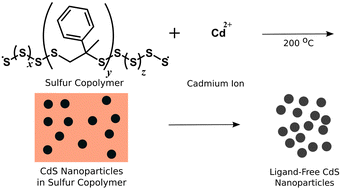Sulfur copolymer for the direct synthesis of ligand-free CdS nanoparticles†
Abstract
Organic coordinating ligands are ubiquitously used to solubilize, stabilize and functionalize colloidal nanoparticles. Aliphatic organic ligands are typically used to control size during the nanoparticle growth period and are used as a high boiling point solvent for solution-based synthesis procedures. However, these aliphatic ligands are typically not well suited for the end use of the nanoparticles, so additional ligand exchange or ligand stripping procedures must be implemented after the nanoparticle synthesis. Herein we present a ligand-free CdS nanoparticle synthesis procedure using a unique sulfur copolymer. The sulfur copolymer is derived from elemental sulfur, which is a cheap and abundant material. This copolymer is used as a sulfur source and high boiling point solvent, which produces stabilized metal-sulfide nanoparticles that are suspended within a sulfur copolymer matrix. The copolymer can then be removed, thereby yielding ligand-free metal-sulfide nanoparticles.


 Please wait while we load your content...
Please wait while we load your content...